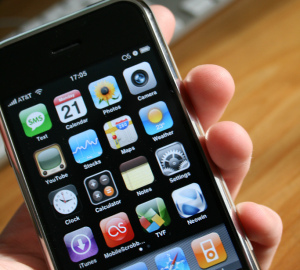AT&T Network Blame Game Takes Weird "It's Apple's Fault" Twist
Last week AT&T, in yet another of a string of PR failures about the health of its network, made things even worse by publicly blaming its customers for, you know, being customers. Over the weekend, though, a new thread was introduced into the narrative: it’s the iPhone’s fault. Not because it’s too popular, which has been the old complaint, but because the hardware doesn’t work right, and AT&T can’t say anything about it for fear that Steve Jobs will reach down through the clouds and smite them.
That sounds pretty tragic and sad for AT&T, but the problem is nobody knows if it’s true, or if this is yet another strategy to shift the responsibility from AT&T.
On Saturday, the New York Times ran a story in which a senior VP at Nielsen says the real problem is with Apple hardware, but that AT&T can’t blame Apple publicly:
Roger Entner, senior vice president for telecommunications research at Nielsen, said the iPhone’s “air interface,” the electronics in the phone that connect it to the cell towers, had shortcomings that “affect both voice and data.” He said that in the eyes of the consumer, “the iPhone has the nimbus of infallibility, ergo, it’s AT&T’s fault.” AT&T does not publicly defend itself because it will not criticize Apple under any circumstances, he said. AT&T and Apple both declined to comment on Mr. Entner’s assessments.
Should we believe this? Pete Mortensen at Cult of Mac points out that the only person to have made this claim so far is Entner, and that he is a marketing analyst at an audience research company and not an engineer. Over at Daring Fireball, John Gruber asks why the iPhone isn’t underperforming on networks globally if it’s a hardware issue:
If it’s the iPhone’s fault, not AT&T’s, why aren’t iPhone users around the world having the same problems as those here in the U.S.? How come iPhone carriers in Europe turned on tethering support as soon as iPhone OS 3.0 was released, and AT&T still, seven months later, has not?
I’ve brought this up before and readers have argued that the U.S. is a far bigger country than those in Europe, so of course U.S. carriers have a harder job than those in Europe. But that argument doesn’t make sense to me. It’s not there’s one single AT&T cell tower providing service for the whole country. When it comes to providing coverage for a large city like New York or London or Paris, what difference does it make how big the rest of the country is?
What’s different about providing wireless service in the U.S. than Europe isn’t the densely-populated metro areas — it’s the sparsely-populated rural areas. But it’s the metro areas where the iPhone is having the severe problems. And, what about Canada? Larger landmass than the U.S., tethering is available, and service quality is good.
Gruber also asks, “If it’s the iPhone’s fault, why have iPhone/AT&T reception problems gotten worse over time?”
On the other hand, the methodology behind Root Wireless’ recent study of networks possibly supports Entner’s claim. The Root Wireless study indicated that AT&T mostly outperforms the other major wireless companies in everything from download speeds to call fail rates. What’s interesting about the study is that Root didn’t use the iPhone to test networks, so its pro-AT&T findings don’t necessarily cover the iPhone experience.
But should any one study be trusted? A PC World study from June, which used laptops and not smartphones to test cellular wireless networks, showed AT&T usually taking the lead in upload speeds, but usually coming in last in reliability. A Boy Genius Report test from August placed AT&T in the middle of the pack on both upload and download speeds (but didn’t test reliability, unfortunately).
As far as I can tell, there’s not enough public information available to believe Entner’s claim. Although it certainly wouldn’t be a shocker to find out that hardware plays some role in the iPhone/AT&T problem (and Apple is as fallible as any company), so far it’s just one third-party executive’s quoted opinion.
In the end, though, it may not matter whether it’s true. Picking the best wireless carrier for yourself depends much more on anecdotal data than on national studies; you’re more likely to find out the truth about coverage in your town by asking neighbors and coworkers what they’ve experienced. Juding by our readers, quality of service varies dramatically for all the carriers across the country. If you don’t like talking to people, here’s a tool for checking coverage from Cnet and Root.
(Thanks to readers Wriz, Nigromancer, and Wireless Joe for some of the survey links!)
“AT&T Takes the Blame, Even for the iPhone’s Faults” [New York Times]
Want more consumer news? Visit our parent organization, Consumer Reports, for the latest on scams, recalls, and other consumer issues.


